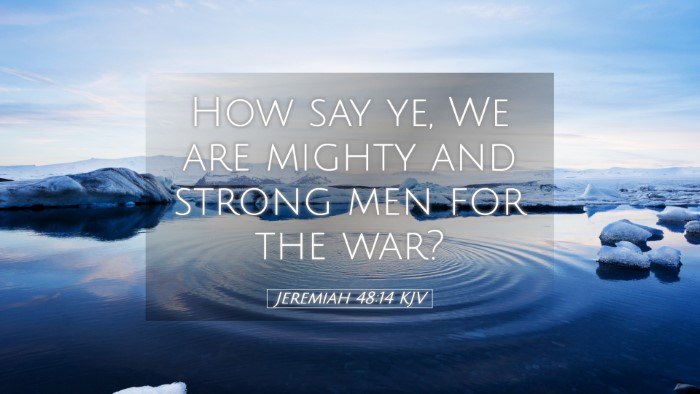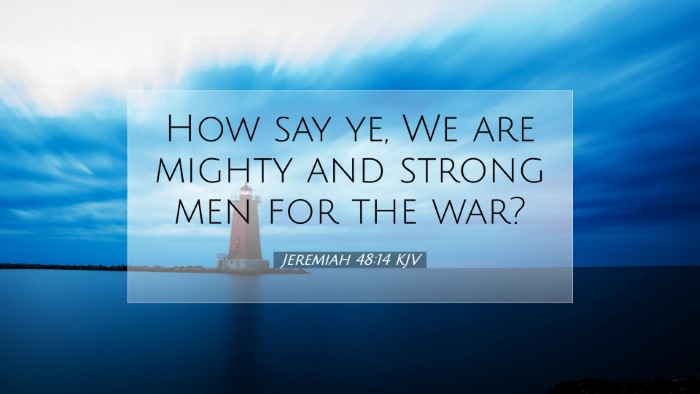Commentary on Jeremiah 48:14
Jeremiah 48:14 states, "How say ye, We are mighty and strong men for the war?" In this verse, the prophet Jeremiah addresses the Moabites, who are expressing confidence in their military strength. This commentary seeks to draw insights from several public domain sources, weaving together the rich tapestry of theological and historical context for the benefit of pastors, students, theologians, and Bible scholars.
Historical Context
The context of Jeremiah's prophecy includes the impending judgment on Moab, a nation historically situated to the east of Israel. Under the leadership of King Nebuchadnezzar of Babylon, Moab was destined for destruction. The Moabites had been a constant adversary to Israel, which deepened the prophetic pronouncements against them.
Exegesis of the Verse
In examining Jeremiah 48:14, we find a rhetorical question posed by the Lord through Jeremiah. The inquiry challenges the Moabites' misplaced confidence. Jeremiah, as a prophet, serves as a mouthpiece for divine revelation, illuminating the futility of their reliance on human strength.
Insights from Matthew Henry
Matthew Henry notes that this verse captures the essence of false confidence. He emphasizes that the Moabites are portrayed as deluded, believing that their numerical and military strength would secure victory. Henry asserts that it reflects humanity's tendency to rely on external might rather than spiritual integrity. He comments on the ultimate irony of their situation: while they believe they are 'mighty and strong,' God already decrees their downfall.
Insights from Albert Barnes
Albert Barnes provides a detailed exploration of the implications of the Moabites' claim. He underscores the idea that their assertion is an example of misplaced pride. Barnes elaborates on the cultural understanding of strength in ancient Near Eastern societies, where military power was often equated with divine favor. Importantly, Barnes points out that the very strength they boast of will not only fail them but will serve as a means by which God will enact judgment upon them.
Insights from Adam Clarke
Adam Clarke takes a more pastoral approach, recognizing that the Moabites’ bravado is akin to the folly of any people who place their trust in human prowess. Clarke emphasizes the spiritual lesson found in this verse, noting that true strength is found in reliance on God alone. He encourages modern readers to analyze where they place their trust and to understand that confidence not rooted in divine assurance is ultimately fruitless.
Theological Implications
This verse serves as a poignant reminder of the nature of divine sovereignty. The Moabites, despite their apparent strength, are rebuked for their self-reliance. This reflects a fundamental biblical principle: God opposes pride and self-sufficiency, as illustrated in passages such as James 4:6, which states, "God resists the proud, but gives grace to the humble."
The Futility of Human Strength
The broader message conveyed through Jeremiah 48:14 is that human strength, military might, or societal status are ultimately inconsequential in the face of divine will. Throughout Scripture, we see this theme reaffirmed; consider the downfall of great empires and leaders who stood opposed to God's plan.
Application for Today's Believers
- Trust in God: Believers are encouraged to place their faith in God rather than worldly measures of success.
- Humble Confidence: The church today must avoid the pitfalls of self-assuredness, remembering that true strength is found in humility before God.
- Ministry and Mission: Pastors and church leaders should be careful not to rely solely on their skills or resources but seek divine guidance and empowerment in their endeavors.
Conclusion
Jeremiah 48:14 encapsulates a powerful message regarding the short-lived nature of human confidence when it is not anchored in the Lord. The insights from public domain commentators such as Matthew Henry, Albert Barnes, and Adam Clarke highlight the timeless truth that true strength lies in humility and dependence upon God. As we reflect on this passage, may we be steadfast in our recognition that God’s purposes prevail, regardless of the might we may possess, and may we continually seek His presence in all our endeavors.


